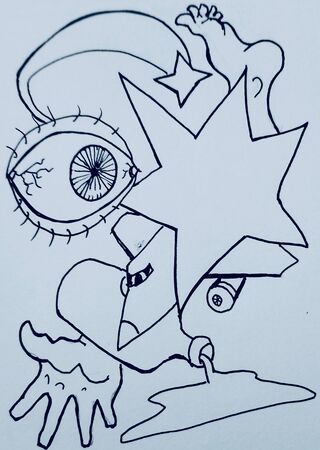Environment
If Accident Rules Our Lives: The Reign of the Random
Part 1 of 4: If agency is illusory, how do we cope with the unknown?
Posted December 7, 2020
Part 1: The Reign of the Random
Joe Lott was an executive at a large computer corporation. On September 11th, 2001, he and four colleagues were set to attend a meeting on the 104th floor of the North Tower of New York's World Trade Center.

Joe was from Virginia, staying at the Marriott next door. Before the meeting that morning he took breakfast with one of his Compaq colleagues, Elaine, to get an update on slides she had added at the last minute to their presentation. Elaine and Joe were friends, and Elaine knew of Joe's fondness for Impressionist paintings. As they headed for the walkway leading to the Twin Towers she handed him a present, a tie bearing a reproduction in bright colors of Claude Monet's "Sunset at Lavacourt," which she had bought on holiday in the Berkshires. Wishing to show his appreciation for the gift, Joe told Elaine he would wear the tie she had given him to the meeting. "‘Well, not with that shirt, you’re not going to put on a red-and-blue tie with a green shirt," she replied. Their appointment was at 8:30. Joe decided, though it would make him late for the meeting, that he would return to his room to change shirts. Elaine continued on to the North Tower.
Joe was still in his hotel when the first hijacked aircraft hit the North Tower between floors 93 and 99 at 8:46. He never saw Elaine, or the rest of his team, again.
To say that Joe Lott owed his life to accident is clearly an understatement. What if Elaine had not learned of his taste for Claude Monet? What if she hadn't thought of buying the tie for him on that visit to the Berkshires? What if she had not gone to the Berkshires at all? What if she had not added those few extra images to the presentation they were scheduled to make, or if she'd opted to brief Joe later, in the tower? What if Joe had not reacted with the gratitude he felt if he'd not decided to wear the tie, what if Elaine had lacked the color sense that told her tie and shirt did not match? What if Joe had done what most people would have: thanked Elaine, pocketed the gift, and proceeded on-time to the event which he had traveled from Virginia to attend?
We live our lives as if we are in control and society teaches us that we can, more or less, fine-tune what happens to our lives, but suppose we cannot? What if accident plays a far greater role in our lives than we imagine? Does the anxiety that pervades modern life, according to psychologists, stem from an inchoate realization that our control is illusory, our ability to achieve calm in life a matter of sheer chance?
Accident, to many of us in our car-oriented culture, summons images of automobile crashes, and the way our society deals with crashes is to ascribe agency, and thus responsibility, to the drivers involved. But if we try to analyze what went into this fender-bender on Main Street, or that crash on I-101 that sent three people to the ER; if we parse the factors that went into why people were driving, when they left home, their reasons for taking a particular road; if we dig into the underlying patterns of traffic, the meteorology behind the occurrence of black ice, or the mental quirk that caused one driver's distraction, it seems possible that the concepts of agency and responsibility could turn out to be less important than we were taught. The psychological shock that hits us in the aftermath of an accident may stem in part from the sudden realization that agency was abruptly bypassed, the ability to control our world failed at a crucial point, necessitating primary reflexes such as fight or flight. Then, for an hour, a day, a week even, our faith in such control is lost. Very soon, though: because we still need to drive to work, because our drive usually is safe—because our culture, our socio-political system, require belief in individual will and responsibility—we reassure ourselves that this "accident" was what the term implies; something out of the ordinary, an exception to the rule.
What we call "accident" is, in effect, another term for the unknown, for everything in the universe that we don't perceive or understand but that affects our lives anyway. Our view of accident, in that sense, is a way into the most quintessential problem any human consciousness faces: how to deal with the unknown. By analyzing our relationship to accident we can triangulate how consciousness confronts its most basic task of exploring our environment and living with what it cannot explain. It may be, by understanding more about the nature of accident, we will be able to better understand, and even adjust, this primordial task.
To figure this out, we must first analyze if "accident" in our lives is truly anomalous, or rather a pervasive, if repressed, determinant of how we live and who we are. In this four-part series we will examine, first, the incidence of random accident in history, in discovery, in our backgrounds, in our daily lives; second, how humans have evolved to cope with, deny, palliate, or insure against the influence of the unknown; and third, the vital influence of accident in making us who we are, and how a more balanced understanding and acceptance of the unknown can make our lives both more peaceful and more productive.


